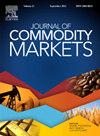Assessing government expenditures multipliers under oil price swings
IF 4.5
4区 经济学
Q1 BUSINESS, FINANCE
引用次数: 0
Abstract
This paper evaluates the impact of government expenditure on output under oil price swings using an SVAR model on a sample of 18 MENA countries. We found that, under an oil price decrease, expenditure multipliers are higher than under an oil price increase and could attain more than one in the short run while going beyond the value of two in the long run. Moreover, on average, spending multiples in oil-exporting countries are higher than those in oil-importing countries at times of decreasing oil prices, while the opposite is noticed at times of increasing oil prices. These results are in line with the recent literature on fiscal multipliers, being large in times of recessions while being weak in times of expansions. Accordingly, some policy recommendations arise from this study as follows.
- The study endorses the adoption of a countercyclical fiscal policy in oil-exporting countries where in times of decreasing oil prices, a surge in government expenditure is more beneficial to the economy, compared to times of high oil prices.
- Oil exporting countries should continue their ongoing effort of diversification away from hydrocarbon sectors to disentangle from implied exogenous shocks and the effects of oil price swings on the fiscal policy stance.
评估油价波动下的政府支出乘数
本文以18个中东和北非国家为样本,使用SVAR模型评估了油价波动下政府支出对产出的影响。我们发现,在油价下跌的情况下,支出乘数高于油价上涨的情况,并且在短期内可以达到1以上,而在长期内可以超过2。此外,平均而言,石油出口国的支出倍数在油价下跌时高于石油进口国,而在油价上涨时则相反。这些结果与最近有关财政乘数的文献一致,即在衰退时期乘数较大,而在扩张时期乘数较弱。因此,本研究提出的一些政策建议如下。-该研究支持石油出口国采取反周期财政政策,因为在油价下跌时期,与高油价时期相比,政府支出的激增对经济更有利。-石油出口国应继续其正在进行的努力,摆脱碳氢化合物部门的多样化,以摆脱潜在的外部冲击和石油价格波动对财政政策立场的影响。
本文章由计算机程序翻译,如有差异,请以英文原文为准。
求助全文
约1分钟内获得全文
求助全文
来源期刊

Journal of Commodity Markets
Multiple-
CiteScore
5.70
自引率
2.40%
发文量
53
期刊介绍:
The purpose of the journal is also to stimulate international dialog among academics, industry participants, traders, investors, and policymakers with mutual interests in commodity markets. The mandate for the journal is to present ongoing work within commodity economics and finance. Topics can be related to financialization of commodity markets; pricing, hedging, and risk analysis of commodity derivatives; risk premia in commodity markets; real option analysis for commodity project investment and production; portfolio allocation including commodities; forecasting in commodity markets; corporate finance for commodity-exposed corporations; econometric/statistical analysis of commodity markets; organization of commodity markets; regulation of commodity markets; local and global commodity trading; and commodity supply chains. Commodity markets in this context are energy markets (including renewables), metal markets, mineral markets, agricultural markets, livestock and fish markets, markets for weather derivatives, emission markets, shipping markets, water, and related markets. This interdisciplinary and trans-disciplinary journal will cover all commodity markets and is thus relevant for a broad audience. Commodity markets are not only of academic interest but also highly relevant for many practitioners, including asset managers, industrial managers, investment bankers, risk managers, and also policymakers in governments, central banks, and supranational institutions.
 求助内容:
求助内容: 应助结果提醒方式:
应助结果提醒方式:


